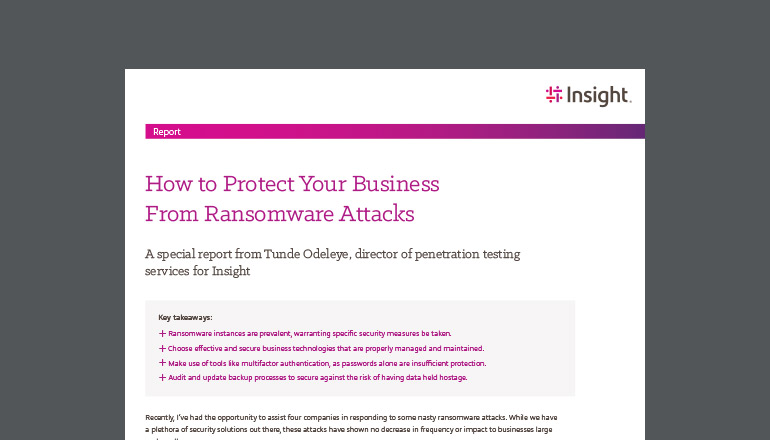
Ransomware defense
Get ironclad ransomware defense and incident response solutions to protect your data, devices and users.
Stay ahead of an evolving threatscape.
Safeguarding your data is vital to building trust with your customers and maintaining your reputation — but attackers are more persistent than ever. As ransomware grows more sophisticated, you need solutions that both prevent and minimize risks to your business.
Risk looks different for every organization. We’ll design, deploy and manage incident response and ransomware defense solutions aligned to your specific cybersecurity needs, data environment and IT complexity.
Four key areas of ransomware defense
Your cybersecurity strategy encompasses all of IT, but some components are more vulnerable to ransomware attacks.
We’ll safeguard your data across:
Identity
Tools, such as Multi-Factor Authentication (MFA) and Single Sign-On (SSO), make it easier to manage user access to your internal systems.
Endpoints
Data storage and protection solutions for your devices defend your teams from malicious actors, whenever and wherever employees work.
Networks
Solutions, such as Zero Trust, deliver robust protection with encryption, network detection, response control and remote access features.
Infrastructure
Modernizing your storage system simplifies data management and streamlines any backup and recovery efforts you may need to take.
Evaluate your ransomware attack readiness by asking the following:
- Do you have segmentation and other risk avoidance strategies in place?
- Are your backups on a modern and up-to-date data protection platform?
- Are your backups stored on systems protected from ransomware?
- Can you recover your entire environment (not just systems or files) in hours?
A question of readiness
Too many organizations believe they have no choice but to pay ransom once an attacker gets ahold of critical data. As a result, ransoms are being paid more often and the amounts required are growing rapidly.
End-to-end incident response services
Our portfolio of incident response solutions, aligned to the National Institute of Standards and Technology (NIST) framework, addresses every part of the cybersecurity cycle.
Before
Phase 1: Preparation
Profiler plus
We’ll assess your security environment and provide a roadmap for standardization and optimization.
Incident response planning
Using the NIST framework, we develop an actionable plan for incident response policies and workflows.
Tabletop exercise
Our on-site and remote simulations prepare key personnel to execute incident response plans.
Emergency Incident Response Retainer (EIRR)
With an EIRR, you’ll get priority access to our team if you experience a cybersecurity event.
During
Phase 2: Incident management
Focused threat hunting
We’ll disable any existing compromises in your IT ecosystem and provide recommendations for the future.
Emergency incident response
When an event occurs, our expert team will provide rapid support to identify, contain and remediate threats.
Event remediation support
Our assessment provides recommendations for proactively and reactively addressing gaps in your cybersecurity.
After
Phase 3: Post incident
Managed Security
Our skilled experts support your internal teams with system maintenance and ongoing protection.
Lessons learned exercise
We retroactively assess your incident response and identify opportunities for improvement moving forward.
Post-incident gap remediation
If an event exposes gaps in your cybersecurity, we’ll select, implement and deploy technologies that address them.
Boost your security.
We’ll help you strategize, implement and manage future-ready IT security solutions. Connect with our specialists and get started today.
